特殊疑问词(小学英语)ppt课件
小学英语特殊疑问词的用法ppt课件
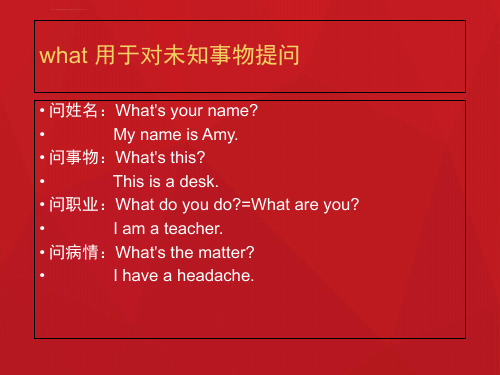
what 用于对未知事物提问
• 问姓名:What's your name?
•
My name is Amy.
• 问事物:What's this?
•
This is a desk.
• 问职业:What do you do?=What are you?
•
I am a teacher.
• 问病情:What's the matter?
•
I have a headache.
在日常生活中,随处都可以看到浪费 粮食的 现象。 也许你 并未意 识到自 己在浪 费,也 许你认 为浪费 这一点 点算不 了什么
在日常生活中,随处都可以看到浪费 粮食的 现象。 也许你 并未意 识到自 己在浪 费,也 许你认 为浪费 这一点 点算不 了什么
表天气: How is the weather in Beijing ? It's sunny.
在日常生活中,随处都可以看到浪费 粮食的 现象。 也许你 并未意 识到自 己在浪 费,也 许你认 为浪费 这一点 点算不 了什么
在日常生活中,随处都可以看到浪费 粮食的 现象。 也许你 并未意 识到自 己在浪 费,也 许你认 为浪费 这一常用because来回答。 例如:Why do you like summer?
Because I can swim.
在日常生活中,随处都可以看到浪费 粮食的 现象。 也许你 并未意 识到自 己在浪 费,也 许你认 为浪费 这一点 点算不 了什么
问年龄: How old are you ? I'm 11 years old.
小学英语语法一般疑问句和特殊疑问句PPT课件

2、如句子里是动词就在这些词前加 don't,doesn't,didn't
(1)主语是第一、二人称(复数)加don’t,第三人称单数加
doesn't
(2)如果是过去式就加didn't
例:I like dogs.
She likes swimming.
I don‘t like dogs.
She doesn’t like swimming.
A How B Where C What D Who
3.A: Was this book in the desk?
B: ___D____
A Yes,it is. B No,it was C Yes,it wasn’t D No,it wasn’t
4.A: ____A___ heavy is John?
Thank You !
e.g经营者提供商品或者服务有欺诈行为的,应当按照消费者的要求增加赔偿其受到的损失,增加赔偿的金额为消费者购买商品的价款或接受服务的费用
This is Amy's bike.(一般疑问句) Is this Amy's bike? Yes, this is. (肯定回答) No, this isn't. (否定回答) Did you go to Beijing last weekend? Yes, I did. (肯定回答) No, I didn't. (否定回答) I have some books. (一般疑问句) Do you have any books?
特殊疑问句
表示疑问,有疑问词(在开头),回答有很
多种可能。
常用疑问词:
When 什么时间 (问时间)
特殊疑问词(小学英语)

W&H
特殊疑问词
what(什么)东西,职业 what…do(干什么)动作 where(哪里)地点 when(什么时候)时间 who(谁)人物 whose (谁的)归属 why (为什么)原因 which(哪个) 选择 how(怎样)方式,感受
1. The cinema is next to the bookstore. 2. Turn left at the bookstore. 3. I come on foot. 4. By bus. 5. Take the No. 57 bus over there. 6. A helmet.
1. We must stop and wait. 2. I’m going to have an art lesson. 3. We’re going to the cinema. 4. Next Wednesday. 5. The film is about space travel. 6. Mid-Autumn Festival is on August 15th.
1. My father is a doctor. 2. I go to school at 7:30. 3. The boy is my friend. 4. The book is mine. 5. I’m fine, thank you. 6. Because I can swim in summer
1. There are three lights in the traffic lights. 2. I’m 45 kg. 3. He is 13 years old. 4. It’s Friday today. 5. My shoes are size 37. 6. My father is tall and strong.
2024年人教版PEP小学英语五年级下册疑问句[1]课件
![2024年人教版PEP小学英语五年级下册疑问句[1]课件](https://img.taocdn.com/s3/m/9caf377b182e453610661ed9ad51f01dc28157b0.png)
9.Is he playing chess? 他正在下棋吗? Yes, he is. 是的,他是。/ No, he isn't. 不,他没有。
1.—Did you read books? 你读书了吗? —Yes, I did.是的,我读过了。/ No, I didn't. 不,我没有读过。
2.①—Is she quiet? 她文静吗? —No, she isn't. She's very active. 不,她不文静。她很活跃。
②—Is she strict? 她严格吗? —Yes, she is, but she's very kind.是的,但是她很和蔼。
4.对指人名词或人称代词提问用who 例:Li Ping is my sister. —Who is Li Ping?
5.对物主代词和名词所有格提问用whose
例:Li Ping's coat—whose coat my father—whose father
6.对具体时间提出疑问,疑问词用when;对具体几点钟提问,用what time
疑问句
一般疑问句
一般疑问句:表示疑问,一般回答只有两种可能Yes或No, 一般疑问句中没有疑问词。
如何将一个肯定陈述句改为否定句: 1.看句中有无be动词,如有,把be动词提到句首即可。 2.看句中有无情态动词,如有,把情态动词提到句首即可。
3.如上述二者都没有,就应把助动词提到句首。分四个步骤: (1) 肯定陈述句中本来是没有助动词的,要加上去,位置在 主语(某人或某物)后,动词前。 (2) 确定助动词用do、does还是did,根据句中动词来判断, 动词是原形,助动词就用do;动词是第三人称单数,助动词 就用does;动词是过去式,助动词就用did。 (3) 将助动词提到句首。 (4) 将原句中动词恢复原形。 注:句中有some时,要考虑是否要改为any。
小升初专项复习特殊疑问词(课件)-通用版英语六年级下册
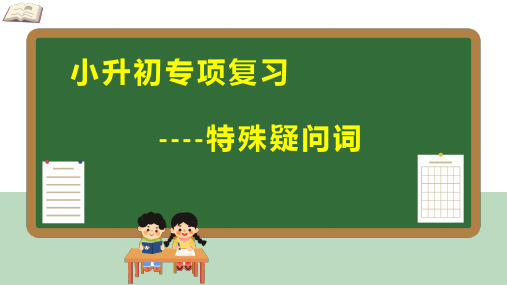
“哪一个”,用对特定的人或事物提问。例如:
“为什么”,用于对原因提问。例如:
7、why
“什么时候”,用于对时间提问,例如。
①When will you finish your homework? 你什么时候能完成作业 Tomorrow. 明天 ②When is your birthday? My birthday is on 14th August.
Grammar
特殊疑问词短语
What time:问时间点 What color:什么颜色(表语) What weather:什么天气 How fast:多快(速度) How long: 多长(时间;距离) How many:多少数量 How much:多少钱 How often:多少次 (频率) How old:多少岁
Grammar
1. 特殊疑问词
特殊疑问词是特殊疑问句中必有(开头第一个)的单词,回答不同的一般疑问句,通常有时间,地点,人名,价格,原因等。
常见疑问词:6W、1Hwho (人) what(物) which(哪一个) when (时间) where(地点) why (原因)how(怎样)
----特殊疑问词
小升初专项复习
Hello, boys and girls! 我的名字叫特殊疑问词。 我的特点是用疑问词开头,由于疑问词是w或h作词首,所以有人给我起了个绰号——WH疑问句。 我的用途是对句子的某一成分进行提问,问具体的人或事、时间、地点、原因等, 因此不能用yes或no来进行简单回答。
Where
What
Who
When
Why
Which
Whose
标题2
特殊疑问句的(不可重复)。
1. -_______ do you go to school? -By bus.2.-________is the red dress?-The red dress is 50 yuan.3. -________do you go to see your parents? -Once a week.4. -_______ e-friends does he have? -Five.5. -_______ did you finish your homework yesterday?-For two hours.6._______is from here to your school? - Twenty miles.
小学英语特殊疑问句ppt课件
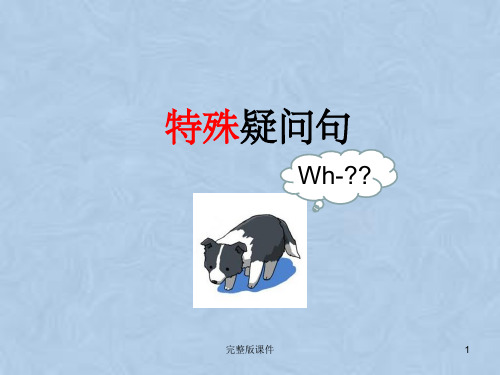
完整版课件
23
就划线部分提问
1. My name is Tom. What 2. I am 13 years old. How old 3.I usually get up at 6:00.
When What time 1.My grandparents live in Shanghai.
Where
4.How can I get to the post office? 我怎样到达
邮局
完整版课件
14
How old 几岁
用来问年龄
1.How old are you? 你几岁了? 2. How old is your father? 你爸爸多大了?
完整版课件
15
How many 多少
用来问数量(+可数名词复数),可用一二三回答。
※ 一般后面跟名词。
完整版课件
12
Why 为什么
问原因
1.Why do you like spring? 你为什么喜欢春天?
Because I can fly kites in spring. 因为在春天我可以放风筝。
2.Why do you go to school by bus?为什么你坐公共 汽车来学校?
么的? 3.What is in your schoolbag? 你的书包里
面是什么?
完整版课件
3
What time 几点
用来问时间
1.What time is it? 几点了? 2.What time is it now? 现在几点了?
完整版课件
4
What colour 什么颜色
问颜色
1.What colour is your bag? 你的书包是什么颜色? 2.What colour is your book? 你的书本是什么颜色?
小学英语特殊疑问词专项复习ppt课件
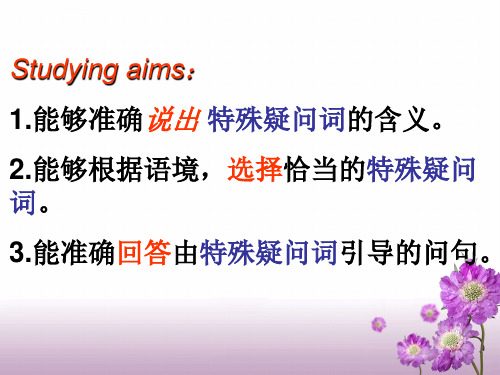
在日常生活中,随处都可以看到浪费 粮食的 现象。 也许你 并未意 识到自 己在浪 费,也 许你认 为浪费 这一点 点算不 了什么
how how many how much how often
how old
多少(数量) 多少(价钱) 怎样,如何 多大,几岁 多久一次
在日常生活中,随处都可以看到浪费 粮食的 现象。 也许你 并未意 识到自 己在浪 费,也 许你认 为浪费 这一点 点算不 了什么
How much rice do you want ? I want five kilos. How much is that coat ? It’s $100.
在日常生活中,随处都可以看到浪费 粮食的 现象。 也许你 并未意 识到自 己在浪 费,也 许你认 为浪费 这一点 点算不 了什么
10、where
My birthday is in May.
7.__H_o_w__do you go home?
I go home by bus.
在日常生活中,随处都可以看到浪费 粮食的 现象。 也许你 并未意 识到自 己在浪 费,也 许你认 为浪费 这一点 点算不 了什么
尝试练习三:
(D )1. How was your grandpa? (B )2. What will he do next week? (A )3. Who plays table tennis better? (C )4. Where are you going tomorrow? (E )5. How many books are there ?
• How are you ? • I’m fine. • How do you like this song ? • It’s very beautiful.
全版小学英语特殊疑问句.ppt

I am going to England.
优选
9
What 什么
What are you doing?你在做什么? I am reading English.我正在读英语。 I am watching TV. 我正在看电视。
What are you going to do there? 你准备去那里做什么? I’m going to buy a book.
特殊疑问句
优选
1
情态动词(4个)
Can 能 eg.I can say English.我能说英语。
Must 必须 eg.You must study English.你必须学英语。
May 可以 eg. You may study English.你可以学英语。
Will 将 eg. I will study English. 我将学英语。
I go to the zoo by bus.
优选
6
How can I get to the library? 我怎样才能到达图书馆?
How can I get to the post office?
How can I get to the cinema?
How can I get to Beijing?
优选
4
小学常考的特殊疑问句
优选
5
How 怎么/怎样
-How do you go to school?你怎么去学校 -I go to school by bus/by train/on foot/by
bike. 你怎样去动物园?
How do you go to the zoo? 我坐公共汽车去动物园。
School、Park、Zoo
小学英语知识点之特殊疑问词的用法
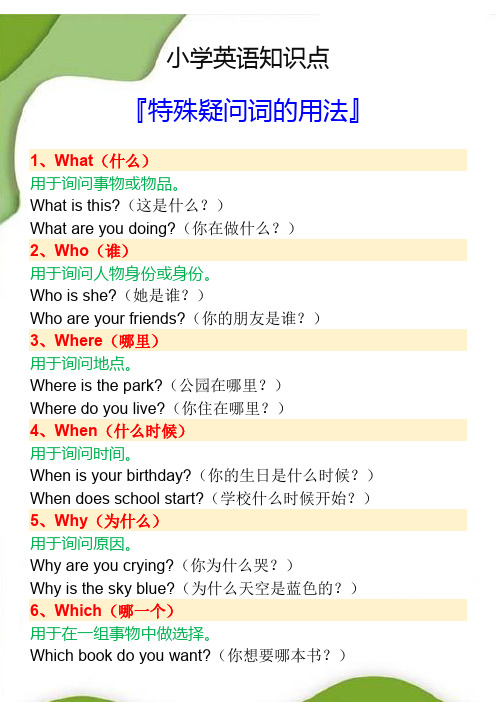
小学英语知识点『特殊疑问词的用法』1、What(什么)用于询问事物或物品。
What is this?(这是什么?)What are you doing?(你在做什么?)2、Who(谁)用于询问人物身份或身份。
Who is she?(她是谁?)Who are your friends?(你的朋友是谁?)3、Where(哪里)用于询问地点。
Where is the park?(公园在哪里?)Where do you live?(你住在哪里?)4、When(什么时候)用于询问时间。
When is your birthday?(你的生日是什么时候?)When does school start?(学校什么时候开始?)5、Why(为什么)用于询问原因。
Why are you crying?(你为什么哭?)Why is the sky blue?(为什么天空是蓝色的?)6、Which(哪一个)用于在一组事物中做选择。
Which book do you want?(你想要哪本书?)Which color do you like?(你喜欢哪种颜色?)7、How(如何,多少)用于询问方式、程度、数量等。
How do you go to school?(你怎么去学校?)How many apples do you have?(你有多少个苹果?)8、Whose(谁的)用于询问所有权。
Whose bag is this?(这是谁的包?)Whose dog is barking?(那只狗是谁的在叫?)9、What colour (什么颜色)用于询问物体的颜色。
What colour is your car?(你的车是什么颜色的?)What colour is your shirt?(你的衬衫是什么颜色的?)10、What language(什么语言)用于询问某人说或写的是哪种语言。
What language is this book written in?(这本书是用什么语言写的?)What language do they use in that movie?(那部电影用什么语言?)11、What subject (什么科目)用于询问学生在学校学习的学科。
小学英语语法---一般疑问句和特殊疑问句
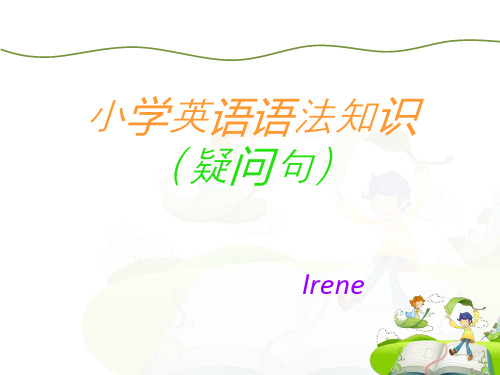
Did …………?
助动词
Does ………… ?
Can ………… ? 情态动词
一般疑问句的回答只能用Yes或No.
一般疑问句:
表示疑问,一般回答只有两种可能Yes,……或 No,……句中没有疑问词。
如何将一个肯定的陈述句改为否定句:
1、看句中有无be动词,如有,把be动词提到句首即 可。be动词(is 、are、was、were)
Thank You !
Mike: My father.
A How B Where C What D Who
3.A: Was this book in the desk?
B: ___D____
A Yes,it is. B No,it was C Yes,it wasn’t D No,it wasn’t
4.A: ____A___ heavy is John?
2、看句中有无情态动词,如有,把情态动词提到句首 即可。 情态动词(can)
3、如上述二者都没有,就应把助动提到句首。 助动词(do、did、 does)
分四个步骤:
(1)肯定陈述句中本来是没有助动词的,要加上去, 位置在主语(某人或某物)后,动词前。
(2)确定助动词用do、does还是did,根据句中动 词,动词是原形的助动词就用do,动词是第三人称单 数的助动词就用does,动词用过去式的助动词就有 did。 (3)把助动词后提到句首。 (4)原句中动词假如发生变化就要恢复成原形。 强调一点,有some的要考虑是否要用any。
Exercises :针对下列划线部分提问
1.We are going to Hainan. Where are you going to ? 2.Amy goes to Shanghai in February. When does Amy go to Shanghai? 3.Kitty is wearing a special costume. Who is wearing a special costume? 4.I go to school by bike. How do you go to school? 5.I like summer. Which season do you like best? 6.My name is John. What is your name.
小学英语 特殊疑问词
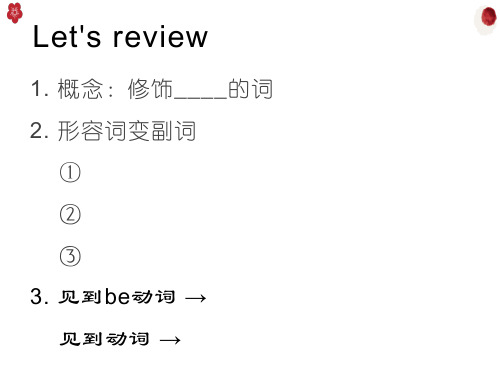
Unit 16 He can do better than his brother
特殊疑问词
Open your books and turn to Page 95
特殊疑问代词
疑问代词在句中用来构成特殊疑问句
特殊疑问句 =特殊疑问代词+一般疑问句?
1. What's this? It's a dog.
2. Who is she? She is our new classmate.
Who always get up early in your family? My mother.
① Miss. Li will teach Danny English. ② The man is my dad.
3. How do you go to school? I go to school by bus.
谁 怎么样
物 动作 人 身体状况
怎么 交通方式
特殊疑问词
---对划线部分提问
Let's review
1. 特殊疑问句&一般疑问句
2. 特殊疑问句
=
+
?
3. what
who how
Let's review
变疑问,也容易 be动词,情态动词 提到句首就可以 若没有,找动词
原形句首要加Do 三单句首加Does 过去式句首加Did 动词全部变原形 遇见some变any 最后问号莫忘记
变一般疑问句(无be动词情态动词)
一找动词二判断 三加Does或者Do 四把动词变原形 遇见some变any 最后记得加问号
They walk to school. Do they walk to school? He walks to school. Does he walk to school? They walked to school. Did they walk to school?
- 1、下载文档前请自行甄别文档内容的完整性,平台不提供额外的编辑、内容补充、找答案等附加服务。
- 2、"仅部分预览"的文档,不可在线预览部分如存在完整性等问题,可反馈申请退款(可完整预览的文档不适用该条件!)。
- 3、如文档侵犯您的权益,请联系客服反馈,我们会尽快为您处理(人工客服工作时间:9:00-18:30)。
how long(多长)长度
6
1. There are three lights in the traffic lights. 2. I’m 45 kg. 3. He is 13 years old. 4. It’s Friday today. 5. My shoes are size 37. 6. My father is tall and strong.
3
1. We must stop and wait. 2. I’m going to have an art lesson. 3. We’re going to the cinema. 4. Next Wednesday. 5. The film is about space travel. 6. Mid-Autumn Festival is on August 15th.
特殊疑问词专题
W&H
1
特殊疑问词
what(什么)东西,职业 what…do(干什么)动作 where(哪里)地点 when(什么时候)时间 who(谁)人物 whose (谁的)归属 why (为什么)原因 which(哪个) 选择 how(怎样)方式,感受
2
1. The cinema is next to the bookstore. 2. Turn left at the bookstore. 3. I come on foot. 4. By bus. 5. Take the No. 57 bus over there. 6. A helmet.
5
what:
what time(什么时候)具体几点
what colour(什么颜色)颜色
what day(星期几)星期几
what size (什么尺码)尺码
what …like(什么样)外貌,性格
how:
how many(多少)数量
how much(多少钱)多少,价格
how old(多大)年龄
how heavy(多重)体重 how tall(多高)身高
7
1. My teacher is kind and nice. 2. My brother is 1.56 metres. 3. The ruler is 20 cm long. 4. This dress is 100 yuan. 5. It’s red. 6. It’s 7:00 now.
8
1. Amy is happy. 2. There are five people in my family. 3. There is a bed and a bookshelf in my room. 4. I’m 20 years old. 5. They’re black. 6. The dinosaur is 3 tons.
4
1. My father is a doctor.
2. I go to school at 7:30.
3. The boy is my friend.
4. The book is mine.
5. I’m fine, thank you.
6. Because I can swim in summer
9
10
Байду номын сангаас
11
12
